In last year’s Spring edition of Seasons, the first Coming to America article started a story that continues to resonate in Connecticut, as well as in the nation at large.
Immigrants, whether arriving decades ago or recently, are woven into the fabric of our state and our country, and the reasons they come – and want to stay – are as varied as their stories. Whether prompted by hardship in their home countries, the call of romance, or the ubiquitous American Dream, the people featured here help make America what it is today.
JOHN HARRIS OF WASHINGTON
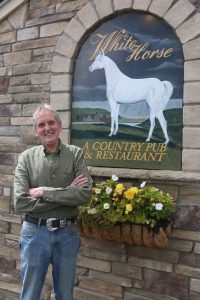
When John Harris was 16 years old, he made a decision that changed the course of his life. The self-proclaimed rebel drove a motorbike across the cricket pitch at his prestigious London school right before a match. He was asked to leave the school.
No matter. Surrounded by the bands of the British Invasion – The Beatles, The Rolling Stones, Cream, The Who – Harris wanted to be in a rock band anyway. Playing lead guitar and singing, he gave it a go. It didn’t work out. He tried classical acting, largely Shakespeare. Not his destiny either.
It was only then, now more than 40 years ago, that Harris took the first steps on a path that turned out to be filled with adventure and a ticket to America, where he embraced a culture that contrasted with the Victorian sensibility he had rebelled against in England.
“There is this wonderful amalgamation of everybody,” says Harris. “The first time I went to a dinner party in America, I was sitting next to a banker, I was sitting next to an industrialist and I was sitting next to a plumber. That’s what I liked. That sort of thing doesn’t happen in England – not in the England I was raised in.”
Sitting in The White Horse Country Pub & Restaurant, his award-winning classic New England pub in New Preston, Connecticut, Harris talks about the practical decision he made after his attempts at rock music and acting. He earned a degree in hotel management. That led to managing hotels in Bermuda, Bahrain and East Africa. While in Africa, he was planning to go to Bali when he was offered an opportunity to work for an American developer. Bali gave way to New Jersey.
“This wonderful gentleman took me into his house as an accommodation until I found my own apartment to rent. He had a big farmhouse. An American and I worked for his company, which was a [commercial] development company at the time, and I learned the building trade from him,” says Harris.
After transferring to the company’s California branch, he met his future wife Lisa, a successful writer who had a talent for development. They moved to the East Coast to take on their own building projects.
Enter 2008. With a crimp in building, Harris was intrigued when a realtor called about an old pub on the banks of the shallow Aspetuck River in northwest Connecticut. Lisa suggested they make it a gastropub and name it after the mythological white horse.
“So I get in touch with the oldest sign painter in England. Don’t forget, it’s 2008 and everything is collapsing. I said, ‘Okay, I need you to paint a white horse on top of a hill, a little lake in the background under a dark sky and we’re going to create a pub called the White Horse Pub … and it’s going to bring hope to everybody,’ ” recalls Harris.
The remodeled restaurant, officially called The White Horse Country Pub & Restaurant and located in New Preston, opened in 2009, decorated with artifacts that seem to reflect on Harris’ life – the Great Seal of Queen Elizabeth I; a check written by Charles Dickens for 160 bottles of 1834 port; a 1920 Indian motorcycle; a 1599 William Shakespeare land document; and a signed Rolling Stones guitar.
Ten years later, Harris runs a bustling establishment brimming with accolades. The staff of 50 opens the doors to some 150,000 customers a year from near and far, and from all walks of life. It is the kind of “polyglot” that Harris so connected to when he came to America.
“What a privilege to have all these people come,” he says.
PRAMOD PRADHAN OF WEST HARTFORD
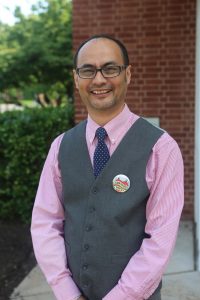 Pramod Pradhan, a trim, neatly dressed man with an engaging manner, emigrated from Nepal to Connecticut in 2004, along with his wife Narshila and 10-year-old son Abhishek. The Maoist insurgency had escalated in their country, leading to violent incidents nearby. The country was in tremendous turmoil, and the Pradhans were eager to start a new life.
Pramod Pradhan, a trim, neatly dressed man with an engaging manner, emigrated from Nepal to Connecticut in 2004, along with his wife Narshila and 10-year-old son Abhishek. The Maoist insurgency had escalated in their country, leading to violent incidents nearby. The country was in tremendous turmoil, and the Pradhans were eager to start a new life.
Pramod and Nashila had good jobs in Nepal. He was a pharmaceutical representative for a multinational company; she was a schoolteacher. But they were increasingly concerned about Abhishek’s future, considering the chaos surrounding them. The family was happy when they learned they had won the “green card lottery,” part of the Diversity Immigrant Visa Program. Americans they’d met via student exchange programs in Nepal vouched for them, which helped their eligibility. They chose Connecticut because of its job opportunities.
Initially, the Pradhans arrived in Colchester, and Pramod and Narshila started jobs at the Hartford Public Library. By 2005, they had moved to West Hartford, glad for the shorter commute. When they purchased their house, they were the first Nepalese family on the block. Now, there are about 15.
Pradhan was struck by the orderliness of American life. He recalls Nepalese society being much more chaotic. With far fewer traffic lights and cows in the street, people are often not on time – they might show up an hour late for an appointment. While he clearly appreciates the U.S., he becomes wistful when talking about Nepalese food. He remembers with fondness an extremely spicy water buffalo meat-based dish and yogurt made from water buffalo milk; neither are easy to come by here. Although Nepalese families run some local restaurants, they usually tone down the spiciness for the generally tamer local palettes.
In 2009, the Pradhans were pleased to become full-fledged citizens of the United States. Eventually, Pramod interviewed for a new position at the West Hartford Public Library (Faxon branch): community engagement librarian. The role was created in recognition of the continually shifting demographics in the area. He shares a telling fact: students in West Hartford schools speak more than 70 languages!
The community engagement roles help to ensure that people of all ages, and from all backgrounds, can benefit fully from library services.
The position seemed a perfect fit for Pradhan, who has been involved with the Nepalese Association of Connecticut and, while he was still at Hartford Library, worked to help a large influx of refugees from Bhutan. He is passionate about helping newcomers adjust to their surroundings and become active in their new communities.
He relishes many aspects of his job, which focuses on fostering partnership within and between communities and organizations. He and coworker Jane Breen reach out to schools, senior centers, town commissions, and the like. Pradhan likes to increase immigrant awareness about how to get involved in the town and civic affairs, noting, “Libraries are so much more than books!” His branch is working to establish a citizenship training program that offers one-on-one tutoring. They refer patrons to other services, too, such as those that help with resumes or social challenges.
When asked what people born and raised here might not fully appreciate about their country, he recounts the reminder he shares with his son: “Half of the people of the world cannot imagine what we have at our disposal here.” He says that some new to this country come to the library and ask how much they must pay for library privileges.
It seems the message of gratitude and abundance resonated with Abhishek, who graduated from UConn and is now in the Air Force.
DAGMAR RATENSPEGER OF GUILFORD
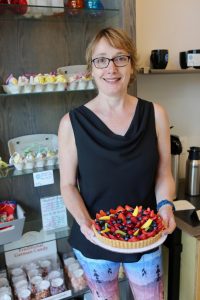 Dagmar Ratenspeger built her American Dream on tartlets, tortes, stollen and strudel. With a modest demeanor and an easy smile, the determined entrepreneur tells the story of an intentionally slow road to find her way in her adopted country. When she finally did, it came full circle to her German roots.
Dagmar Ratenspeger built her American Dream on tartlets, tortes, stollen and strudel. With a modest demeanor and an easy smile, the determined entrepreneur tells the story of an intentionally slow road to find her way in her adopted country. When she finally did, it came full circle to her German roots.
“When I first came over here, you think, ‘Okay, you don’t fit in right away, but with this business being a German bakery, it is kind of like, yes, you should be German.’ It’s not a bad thing to know you have the accent and all that,” she says, sitting in Dagmar’s Desserts, her Old Saybrook bakery.
In 1994, Ratenspeger was working as a secretary in the city of Nuremberg in the German state of Bavaria. That was when she met her German-born husband, who was living in America and running his own commercial photography business. A year later, when she was 25 years old, they married in Guilford while she held a three-month fiancé visa. She came to a different culture, knowing few people and surrounded by a language she had spoken only in the classroom.
“I think it’s just like getting to know the country and making friends, Of course, it’s always a little bit lonely, but on the other hand, it’s like, ‘Oh, you are in the U.S., so it’s very exciting,’ ” she says.
She eventually decided she would attend Southern Connecticut State University, which required getting her GED (German schools did not equate). She graduated summa cum laude with a degree in economics. While looking for a job in her field, she taught German and worked part-time at an Italian gourmet store. That’s when it dawned on her that she could sell German desserts.
“Everybody who comes to a different country, they always miss some food there, and I always thought there is a niche for Austrian and German baking. Then I started baking cakes, some of the recipes I knew from my mom,” she says.
She started her business in 2006 at a Deep River industrial park. She laughs as she mimics opening the large rollover door in the morning to customers as if it were a garage start-up. She remembers protectively bringing back ingredients from Germany in her suitcase – vanilla, sugar, baking soda, custard powder, almond paste. Two years of success spurred her to find a shoreline storefront. Although she has a pastry chef now, Ratenspeger is often found up to her elbows in cake batter. She is particularly proud that she has been able to bring a bit of Germany to other immigrants.
“You don’t really know how many Germans live around here because you don’t see them that much, but with the bakery, [I’ve discovered] there are really a lot of Germans here, a lot of people who have German ancestors. And they come in and they look for things that grandma made,” she says.
When Ratenspeger talks about America, the conversation always comes back to how much she enjoys meeting people. She says those outside America often view the country in terms of extremes – the biggest or the fastest – because they don’t get to meet everyday people. When her parents come to visit, their biggest hurdle is in understanding the work hours: “They are so used to four- to six-week vacations. Germans are the biggest travelers in the world.”
Had she never left Germany, she believes she would have worked in an office and had those lengthy vacations herself. But Ratenspeger has absolutely no regrets: “I like having a bakery because it’s a happy place,” she says with a smile.
RAUL PINO OF HARTFORD
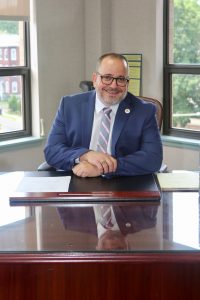 Raul Pino, MD, MPH, has been Commissioner of the Department of Public Health since late 2015, and he has traveled a long road to get there. In 1995, Pino, his (now former) wife Sandra, and their 4-year-old son Raul Luis emigrated from Cuba. Pino was a plastic surgeon and burn specialist and Sandra was also a physician.
Raul Pino, MD, MPH, has been Commissioner of the Department of Public Health since late 2015, and he has traveled a long road to get there. In 1995, Pino, his (now former) wife Sandra, and their 4-year-old son Raul Luis emigrated from Cuba. Pino was a plastic surgeon and burn specialist and Sandra was also a physician.
Pino and his family were political refugees from the harrowing Communist regime. Around that time, many Cuban refugees were arriving in the Hartford area, with tens of thousands settling across the United States.
Arranging for emigration was a grueling process, involving many failed attempts to obtain safe passage. Finally, Reverend Mark Pendleton, who at the time led St. Luke’s Episcopal Church in South Glastonbury, agreed to sponsor the family. Pendleton and Pino were friends who had met during Pendleton’s trips to Cuba.
Pino remembers arriving in Glastonbury late on a chilly June night, and being greeted with the distinctive smell of American coffee the next morning. That aroma continues to take him back to his first day in his new home.
“Glastonbury was the best thing that ever happened to us,” he says. He describes being embraced by the community, remembering Dot and Charlie Pittman from the church with special fondness. The couple would readily jump into action whenever the family needed help.
Pendleton and his congregation helped the Pinos, who had moved in behind the Old Cider Mill, to learn English. While the younger Raul picked the language up easily – his father notes that Raul, now an adult, speaks Spanish with a “Nutmegger accent” – the adults struggled to master it. Pino recalls a family game of running up the stairs as their English teachers approached the house. The last one to make it upstairs was the one who had to start conversing in English.
Everything was different in America. Pino was struck by the deep greens of the summer vegetation – the greens had been lighter at home. And when the family first encountered snow, they stuck out their tongues to catch the flakes. He marveled at the peaceful feeling he experienced when the landscape was blanketed in white.
One of the biggest frustrations was the Pinos’ unfulfilled desire to again work as physicians but “life took off in a different direction,” he says. The arrival of a second child, Carla, kept the family busy.
In the early years, he worked at many different jobs, including tutor, food packer, and nurse’s aide. Tough economic circumstances meant that they couldn’t afford the exams required to practice medicine here. Pino observes that it can still be quite a cumbersome and discouraging process for professionals who emigrate here, and wonders if more can be done to help professionals transition, so that they can contribute meaningfully and help fill the need for highly qualified workers.
Eventually, Pino acquired a Master’s Degree in Public Health at UConn, and at this point has nearly two decades of experience in state, municipal, and community public health agencies.
But when asked what makes him most proud, Pino doesn’t mention his important public health role. He is proud that his family did not disappoint those who helped them from the beginning. Dot and Charlie and several others have passed on, and he wishes they could see how far the Pinos have come. Carla is now 18, and Raul Luis has just graduated from Cornell University. He will soon start his career as a physician assistant.
Donna Caruso Bowden writes from Deep River, Connecticut. Her articles have appeared in the Boston Sunday Globe, Marinalife Magazine, Seasons Magazines, Yachting, Soundings and River and Shore; she is a contributing editor for Embassy Cruising Guides.
Katherine Hauswirth (fpnaturalist.com) is the author of a Connecticut nature essay collection entitled, “The Book of Noticing: Collections and Connections on the Trail.”



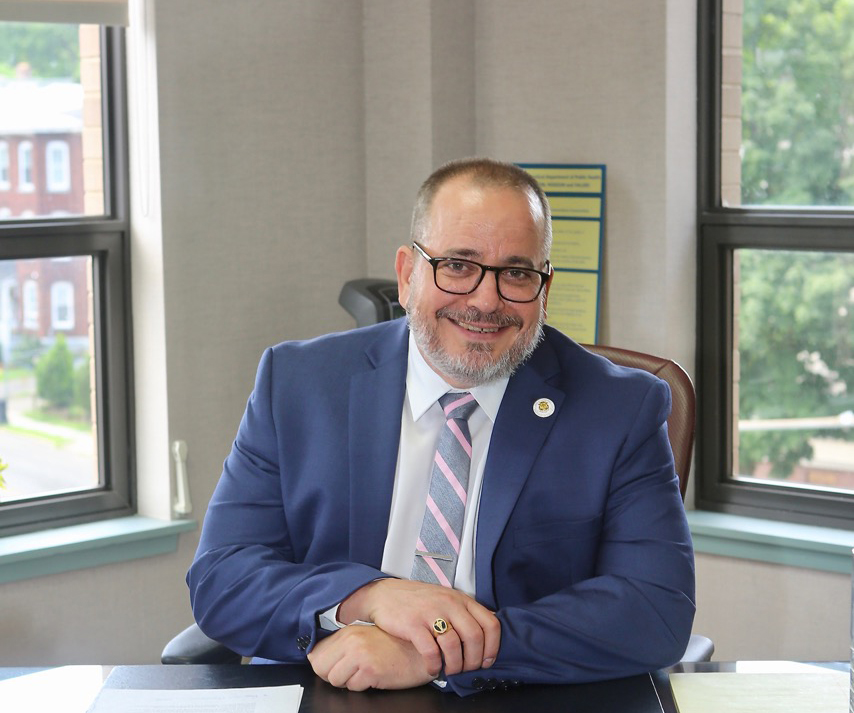



More Stories
Sailing the Seas: Cruising from Connecticut
To the Ends of the Earth with Nansen Polar Expeditions
River Cruising: Active Days on a Peaceful River in a Luxury Hotel That Follows You